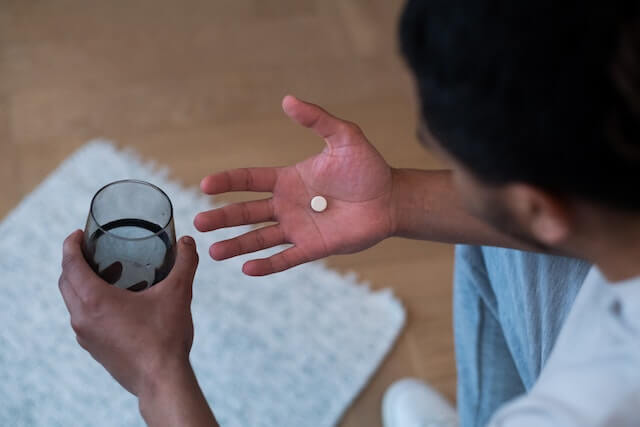Sex is often thought of as a pleasurable and enjoyable experience, but for many people, it can become a source of anxiety and stress. When we let our worries and fears take over, the mere thought of being intimate with a partner can become daunting, and even lead to difficulty in performing sexually. This can cause a strain on relationships and can make it difficult to fully enjoy the experience of sex. Many people can relate to the feeling of letting their worries about performance get in the way of intimacy and pleasure.
If you are a man who is worried about his upcoming performance in the bedroom, then you are not alone. In fact, most men have suffered from some form of performance anxiety. Take comfort in the knowledge that these issues are not only common ones but also extremely treatable ones.
Take a deep breath and continue reading if your anxiety levels are ruining your romantic evening at home. As Shag Longer answers the question: what causes it? Can performance anxiety cause premature ejaculation? and how can you treat it?


What is sexual performance anxiety?
Performance anxiety is a psychological condition that affects many men at some point in their lives. The condition may be caused by many psychological factors. It is commonly associated with a fear of not doing something well enough, a lack of confidence, or a misunderstanding about your partner’s expectations, causing a negative impact on their sex life.
Symptoms and causes
As you get older, you could start to worry that your body isn’t as great as it once was because society’s perception of what makes a nice physique changes year after year. One minute the “dad bod” is in, next every girl wants a ripped man with a six-pack.
Troubles in your relationship can lead to other problems as well. Relationships may be both the cause and the cure of performance anxiety, whether you’ve been with the same spouse for years and are concerned that things are getting a little stale or someone starting out in a new relationship becomes anxious over whether they can please their new partner.
Here are a few things to look out for that are symptoms and causes of performance anxiety:
- Worry or guilt regarding sexuality in general
- Relationship problems
- Worries about if your genitals aren’t big enough
- Fear that you don’t have enough sexual experience or aren’t “good enough” at sex
- Embarrassed over previous negative sexual experiences (maybe you had erectile dysfunction or couldn’t delay ejaculation)
- You feel insecure about your body
Can performance anxiety cause premature ejaculation?
Well, it can often be a kind of chicken and the egg situation. Sometimes it can be difficult to determine whether sexual performance anxiety is a cause or a result of another issue. Men who suffer from performance anxiety can suffer from other sexual dysfunctions like premature ejaculation or erectile dysfunction.
If you have suffered from a sexual dysfunction before, this will ultimately be in your mind as you head into your next sexual encounter. This will, in turn, raise your levels of anxiety making it difficult to get an erection (erectile dysfunction), or maybe you ejaculate too early to finish the experience quickly (premature ejaculation) It is a vicious cycle!
In the case of premature ejaculation with performance anxiety, if your body is in an uncomfortable situation it may make you ejaculate earlier than you want just to get the experience over with. Some men can feel premature ejaculation coming on as soon as they get down to business and often feel like they can’t stop it.
But again could this be because you experienced PE before that makes you feel like this? premature ejaculation varies from:
- Lifelong premature ejaculation – This is when you have it nearly all of the time since your first sexual encounter.
- Acquired premature ejaculation – This is when you develop premature ejaculation after having previous sexual encounters without a problem.
What are the treatments available for sexual performance anxiety?
There are numerous therapies readily available. These include short-term therapies that take effect quickly like medication or long-term remedies that function over a longer period of time being a more sustainable option.
Cognitive behavioral therapy (CBT)
CBT works by recognizing and treating the ways in which a person’s thoughts and behaviors interact to cause anxiety. Therapists help patients understand how unhelpful thought patterns affect a person’s emotions and behavior.
By analyzing what causes you to feel bad, nervous, or afraid, CBT aims to break negative thought patterns like these. It can assist you in changing your negative thought patterns and enhancing your mood by helping you make your difficulties more manageable.
Starting off a therapist will guide you through a way of thinking to achieve this and break that negative loop. However in the long run you can manage this on your own and deal with issues without a therapist’s assistance.
There are many benefits to CBT which include:
Improving your mental health
It can be a good idea to seek professional assistance if you’re experiencing generalized anxiety. Your fear of performing in front of others could be a symptom of generalized anxiety disorder, which can be treated with CBT.
Elevating your self-image
While there is nothing wrong with admiring pornographic images or celebrity photos, if you find yourself constantly comparing yourself to other people, you may develop sexual performance anxiety. You can think that your physical characteristics don’t “stack up.”
CBT can help you eliminate these comparisons and realize you are your own person.
Mindfulness
Mindfulness is a powerful strategy for overcoming any form of worry. Particularly during intercourse, it’s critical to maintain awareness. Being mindful involves focusing on your actions rather than your thoughts and remaining in the present.
As you might expect, using mindfulness techniques while engaging in sexual activity can improve the experience and aid in overcoming performance anxiety. It can be helpful to change your emphasis from how you’re performing by focusing on what you’re doing during sex— focusing on the different sensations such as touch, taste, and sound. As well as what you feel physically and emotionally.
There are many techniques you can practice on a daily basis to help you get into this zone, such as breathing techniques and meditation.


Check out our full in-depth article on how you can train your mind to help with premature ejaculation
Medication
If self-help methods are unsuccessful, selective serotonin reuptake inhibitors (SSRIs) may be used to treat premature ejaculation. Selective serotonin reuptake inhibitors (SSRI), including paroxetine, fluoxetine, and sertraline, are usually prescribed to treat depression and other mental health conditions. But it has been found that one of the side effects of them, is they can delay ejaculation times in men making them last longer in bed. Clinical studies have demonstrated that the intravaginal ejaculation delay time gradually increased following SSRI therapy.
Medication is one of the more short-term solutions. But probably something you don’t want to rely on continuously.
Talking
Similar to therapy, talking through your issues with your partner frequently can help you feel much lighter. When you begin to discuss your worries, many of them may turn out to be unfounded. You might discover that your companion is incredibly sympathetic. It’s possible that you’re stressing out about nothing at all, and when a month or so has passed, you’ll wonder what the issue was in the first place.
Together, you might be able to find solutions. If this concerns you because you are out of shape, you may devise a sexual practice that is less physically demanding, such as side-by-side or prolonged foreplay. Or, if you’re concerned that you’re not making her happy, you may figure out how to make her happy.


Conclusion
The relationship between performance anxiety and premature ejaculation is complex. Although some studies have suggested that the symptoms of performance anxiety are more than by chance, there is no empirical evidence to support this conclusion. However, the presence of performance anxiety may be indicative of a higher vulnerability to premature ejaculation.
There are several possible treatments for premature ejaculation. These include medications, counseling, and behavioral therapy. For many patients, the most effective approach is to address the emotional concerns that are contributing to the problem. Oftentimes, a licensed professional therapist can be a great help in assessing the underlying factors and developing an effective treatment plan.












